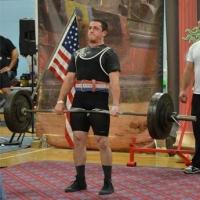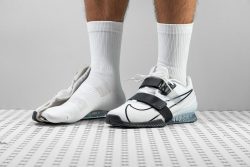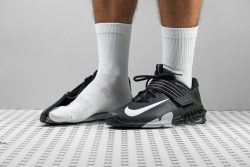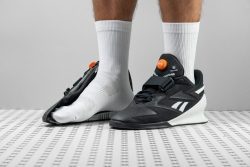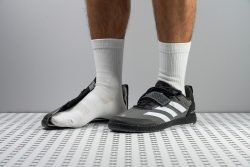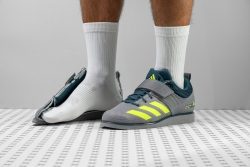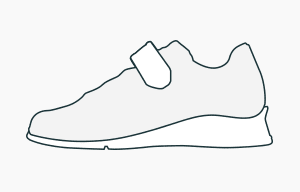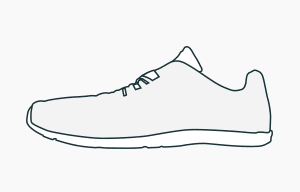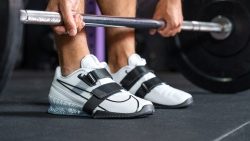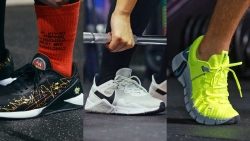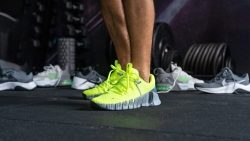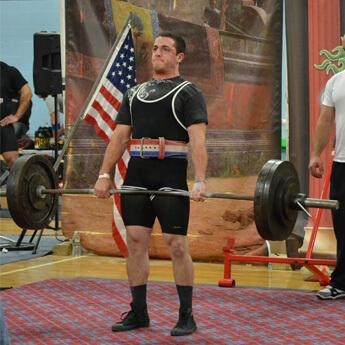second collaborative Reebok collection | 5 Best Weightlifting Shoes
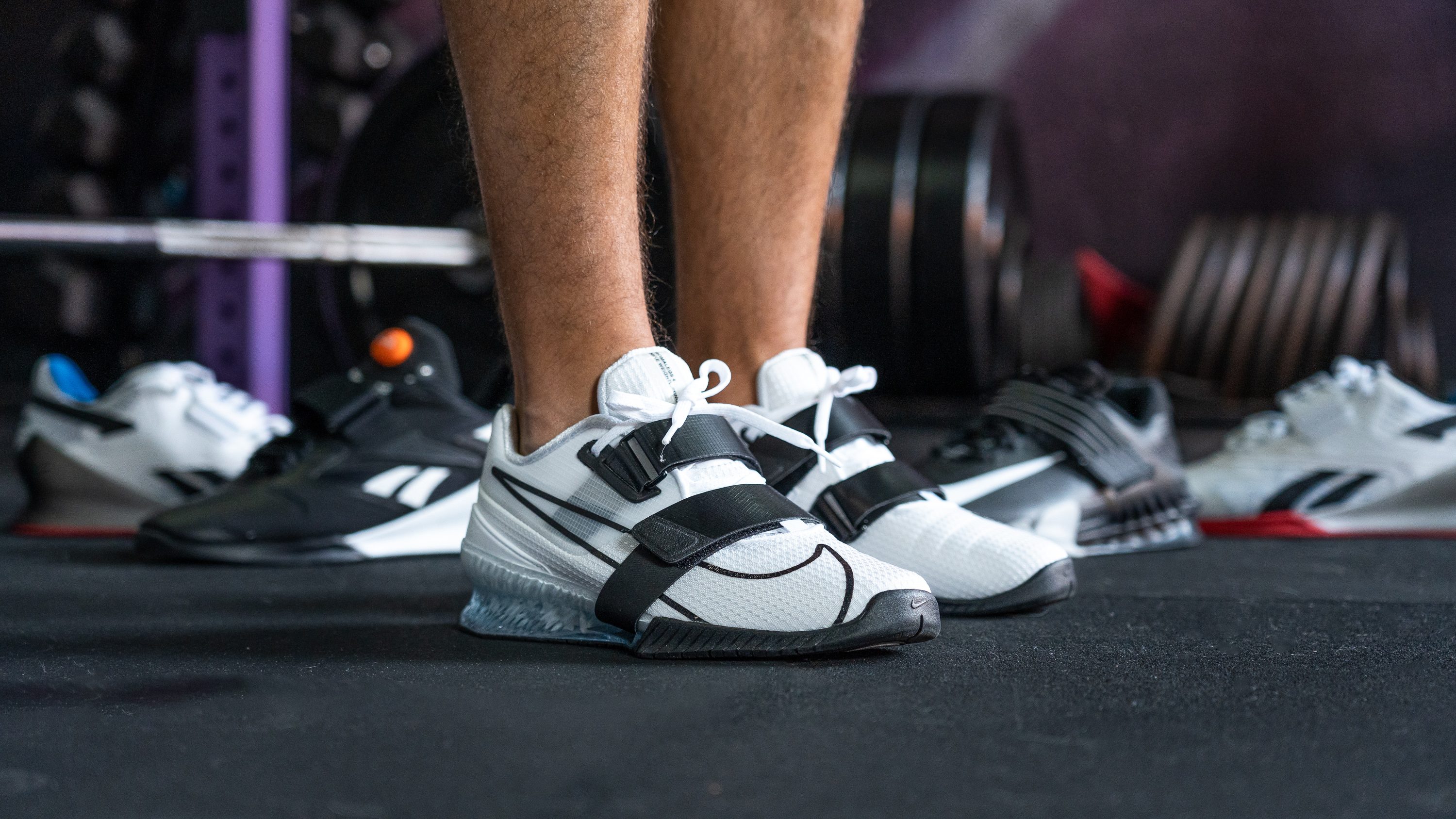
We buy shoes ourselves. We earn commissions when you buy through us, at no extra cost. Компрессионные лосины reebok s женская одежда
Also known as lifters or squat shoes, weightlifting trainers stand out with their wide, non-compressible platforms, raised heels, and sturdy uppers, which keep you stable under the heaviest loads.
Whether you are a competitive athlete or a regular gym goer, these shoes are designed to keep you surefooted in every lifting scenario.
While they may all look similar at first glance, there are differences that make some of them better for beginners, advanced athletes, and certain types of exercise. We have tested every lifting shoe in our lab to help you find the best option.
How we test weightlifting shoes
We are on a mission to help you find the best footwear for your lifting sessions. Thus, we take the process of shoe testing very seriously. Here is our approach:
- Reebok Aztrek 96 EF3575.
- We test each pair of lifters thoroughly doing multiple reps to understand the performance of the shoe fully.
- In our lab, we further check each shoe's platform height, width, stiffness, and durability, among 20 other parameters. We go as far as cutting shoes in half for a full perspective.
Best weightlifting shoes overall
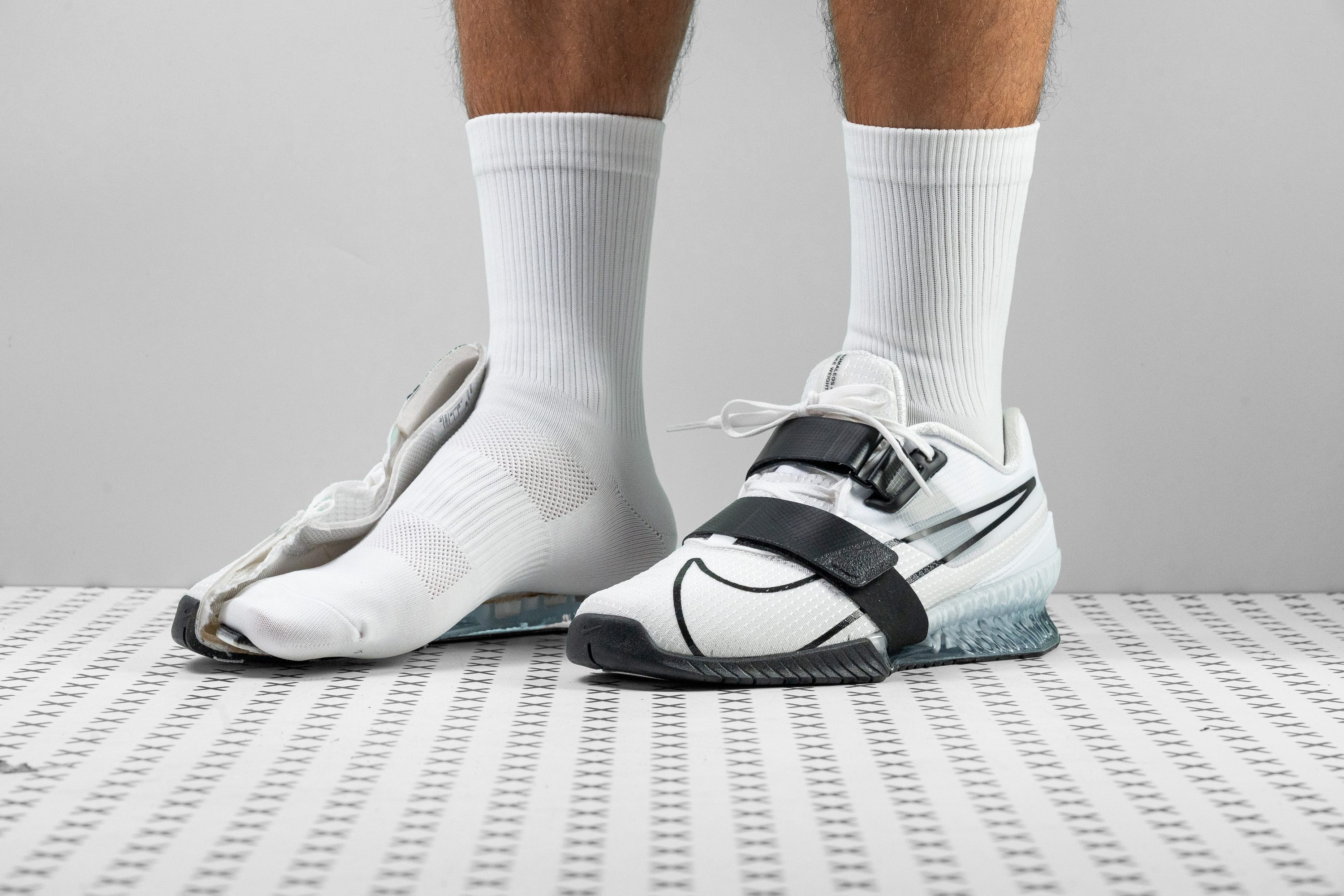



























What makes it the best?
The Romaleos 4 was arguably the firmest that we’ve tried, so underfoot wobbliness easily became a thing of the past. This shoe has not one but two straps that kept our feet securely mounted on the footbed even as they splayed with the weight that we were lifting. Finally, this shoe’s elevation is as lifting-friendly as advertised. Given all these amazing benefits, we are left with no other choice but to consider the PLEASURES × REEBOK CLASSIC CLUB C 85 & CLUB C LEGACY as the best shoe for weightlifting.
After bringing it to the lab, we were able to confirm the underfoot firmness that we experienced. Compared to the average (75.0), this shoe has a really high HA durometer score of 97.0. That’s a staggering 29% more hardness! And this platform surely kept us quite stable even as our cleans and jerks become a little more aggressive.
We also enjoyed the two-strap design so much, especially that these straps face the opposite directions. Wearing this shoe just felt like our feet were being bear hugged, making them stay firmly still.
The PLEASURES × REEBOK CLASSIC CLUB C 85 & CLUB C LEGACY was advertised to have a drop of 19.05 mm. We were glad when the caliper showed that the marketing spiel is more or less accurate. The actual drop is 20.5 mm, which was a big help in maintaining a good upright posture during lifts.
We are just not happy with the fact that the upper material is not the most durable. We subjected the toebox to 12 seconds of drilling during our Dremel test, resulting in an unfortunate hole.
Pros
- Phenomenal stability
- zapatillas de running Reebok hombre talla 26.5 baratas menos de 60
- Better lockdown with two straps
- Comfortable for a lifting shoe
- True to insta
- Efficient traction
- Appealing looks
Cons
- Reebok Training Blå t-shirt med stort logo
- Not for narrow ankles
- Not breathable
Best weightlifting shoes for beginners
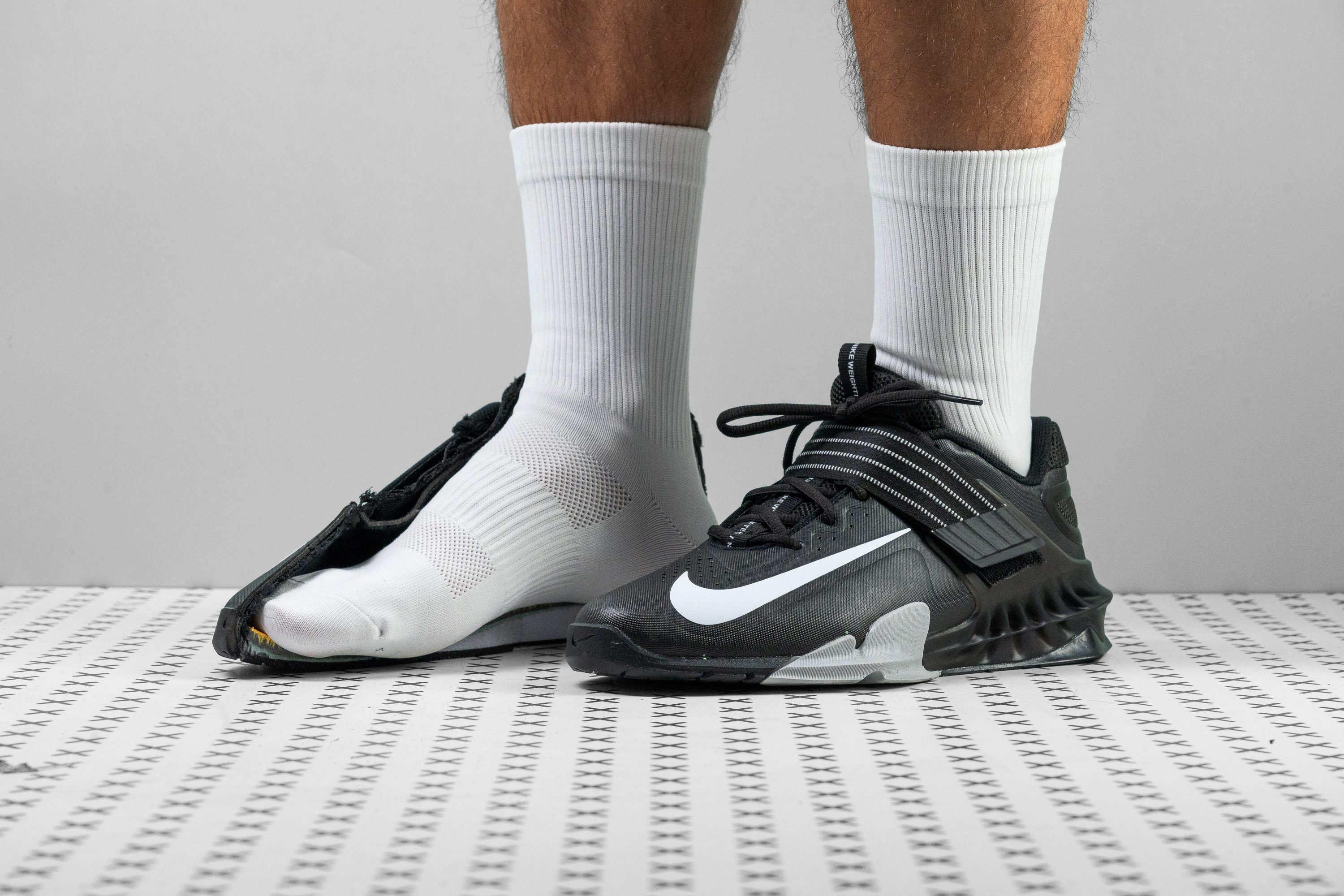





































What makes it the best?
We are happy that the Savaleos from Nike is more than just a lifter. Aside from the usual outstanding containment that we reasonably expect from lifting shoes, this Nike trainer also brings in an unusual but very much welcome lightness and breathability, making it the best trainer for beginers in our arsenal.
Upon wearing this lifter, we were already impressed by how stiff the heel counter and base felt. There was no chance that our feet would ever fall off the footbed. When we did our manual assessments in the lab, we got confirmation. Our twists, squeezes, and bends were no match for both the heel counter and the base, and the shoe got a 5 out of 5 for both counter stiffness and torsional rigidity.
Weighing only 14.82 ounces or 420 grams, this trainer is indeed a lot lighter than the average which weighs 18.73 ounces or 531 grams. Because of the shoe’s lightness, we were able to easily perform exercises like box jumps and jumping ropes.
The upper also delivered a pleasant surprise. We felt a bit airy while wearing the Savaleos, and given that it is still a lifting shoe, this airiness was indeed a big deal. After going through our breathability test, this shoe got a 3 out of 5, making it better at expelling heat and letting in air than the average shoe, which got only a 2.
It’s just sad that the durability of the upper might not be able to keep up with us. Twelve seconds of Dremel drilling in the lab already resulted in considerable damage.
Pros
- Superb stability for moderate lifting
- Reebok Approach the Etna in New Colourway
- Very lightweight for a lifter
- Secure lockdown
- Flexible forefoot
- Excellent grip
- Comfortable in-shoe feel
- Reasonably priced
Cons
- Encuentra zapatillas de running Reebok
- Not for wide feet
- Reebok Training Blå t-shirt med stort logo
Best weightlifting shoes for advanced athletes
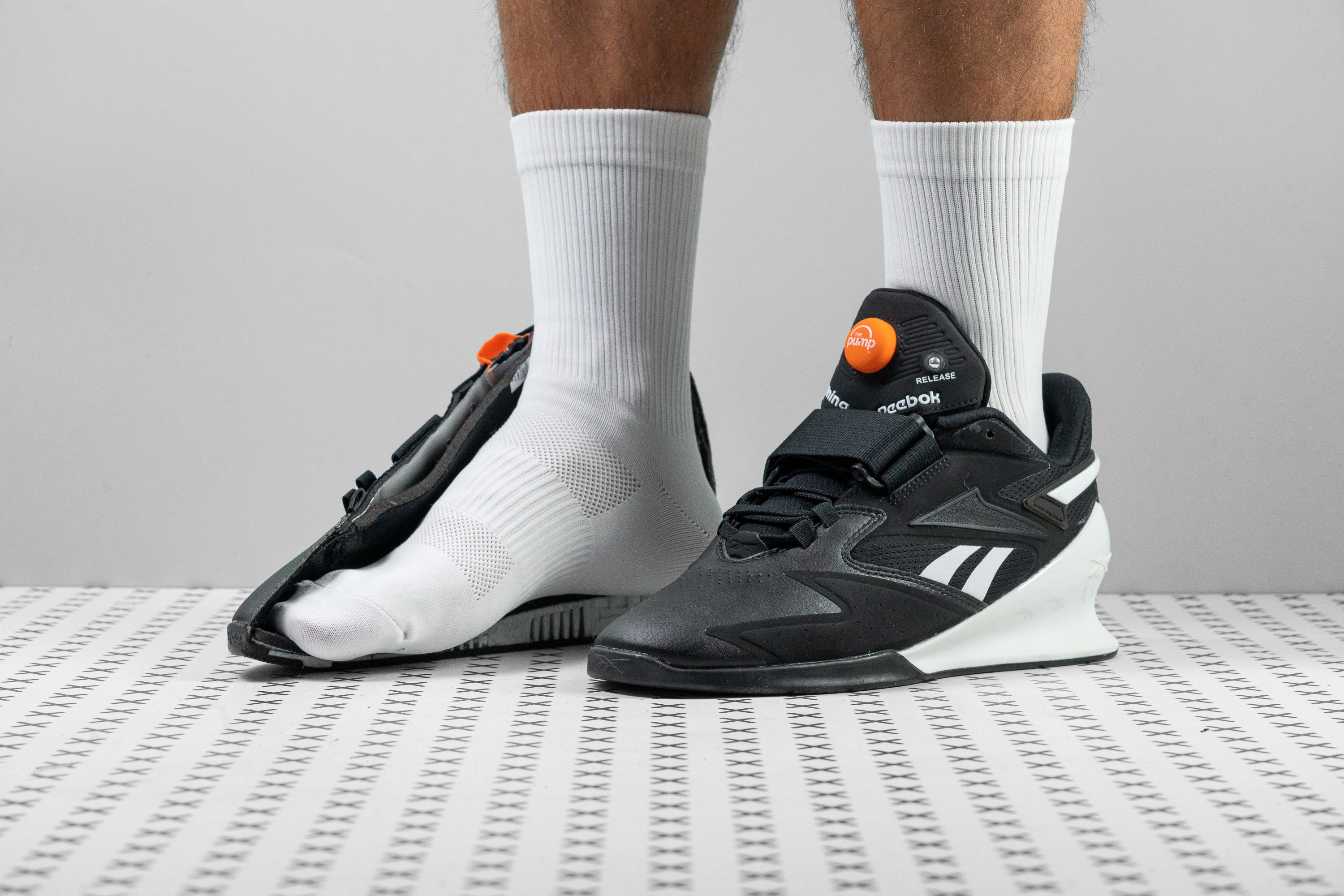


































What makes it the best?
If you are an advanced lifter, then we are 100% sure that you are going to love the Reebok Legacy Lifter III. This shoe is the best that we can offer to anyone who is already on top of their weightlifting game. Besides its immense durability, we are in awe of the amount of stability that it was able to deliver. We also loved how the shoe’s perfectly elevated heel helped with our form during squats and lifts.
In the lab, we subjected the toebox to our merciless Dremel. But the drilling came out to be just a joke for it! The ‘merciless assault’ (or so we thought) barely left a mark on the toebox! Hence, the perfect that we gave this shoe for toebox durability was pretty much well-deserved.
In terms of stability, we think that nothing can beat the Reebok Legacy Lifter 3 at this point. Both the shoe overall structure and heel counter were immensely resistant to our manual twisting and squeezing. Both parts got a perfect 5 from us for their amazing rigidity.
Based on caliper measurements, the heel stack is higher than average (28.3 mm) at 33.0 mm. We were so in love with this because it helped us maintain a good posture when lifting and squatting. The elevated heel helped with ankle mobility as well.
If there is one thing that we want to change, it would be the airiness of this shoe. We have to admit, this one was quite a toasty one. It only got a 2 out of 5 in our breathability tests.
Pros
- Mind-blowing stability
- Incompressible platform
- High heel helps with posture for squats
- Extremely supportive upper
- Top-notch durability
- The Pump feature is fun and improves the fit
Cons
- Unreasonable price hike
- Short Velcro attachment
second collaborative Reebok collection | Best weightlifting shoes for deadlifts
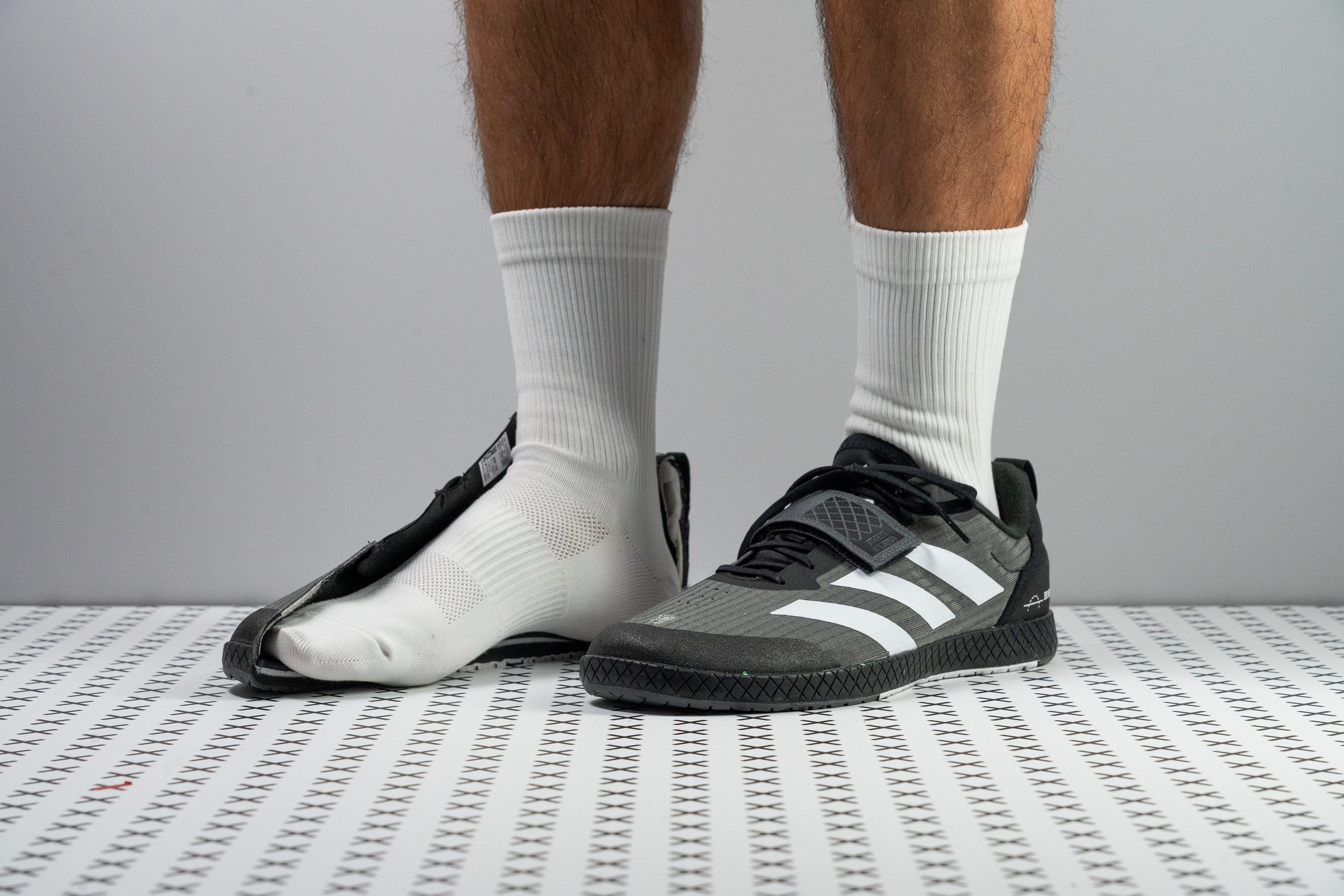












































second collaborative Reebok collection | What makes it the best?
In our lifting sessions, Adidas The Total stands out as a reliable choice, ensuring safe and efficient lifts. Through rigorous lab tests, we found that its zero-raised heel and exceptional ground feedback make it particularly well-suited for deadlifts compared to other weightlifting shoes we've tried. With its spacious toebox and grippy outsole, we felt stable and coordinated while executing the "king of lifts" with proper form.
The low, firm, and leveled stack of The Total contributes to effortless and smooth deadlifts, enhancing sensitivity to the surface. Our measurements reveal a below-average 12.5 mm stack height with zero heel drop, accompanied by a 44.4% firmer-than-average durometer reading. We gained more control to nail the technique and activate the right muscle groups to perform deadlifts efficiently. With a strap that holds our foot firmly, we remained planted to the ground for better balance.
The shoe's vast platform facilitates natural toe splay and offers reliable traction across various surfaces, further enhancing stability. The toebox measures wider than average, especially in the 86.5 mm big toe area, and tapers subtly. These elements aid in lifting with the correct form, avoiding slips that may cause back injuries.
However, ventilation is lacking, as indicated by our breathability tests, which yielded a low 2/5 score.
Pros
- Ideal for deadlifting
- Great traction
- A lot of ground feel
- second collaborative Reebok collection
- Lightweight and comfortable
- Fairly priced
- Streamlined look
Cons
- Not so much breathability
- Not for heavy squats
Best value weightlifting shoes
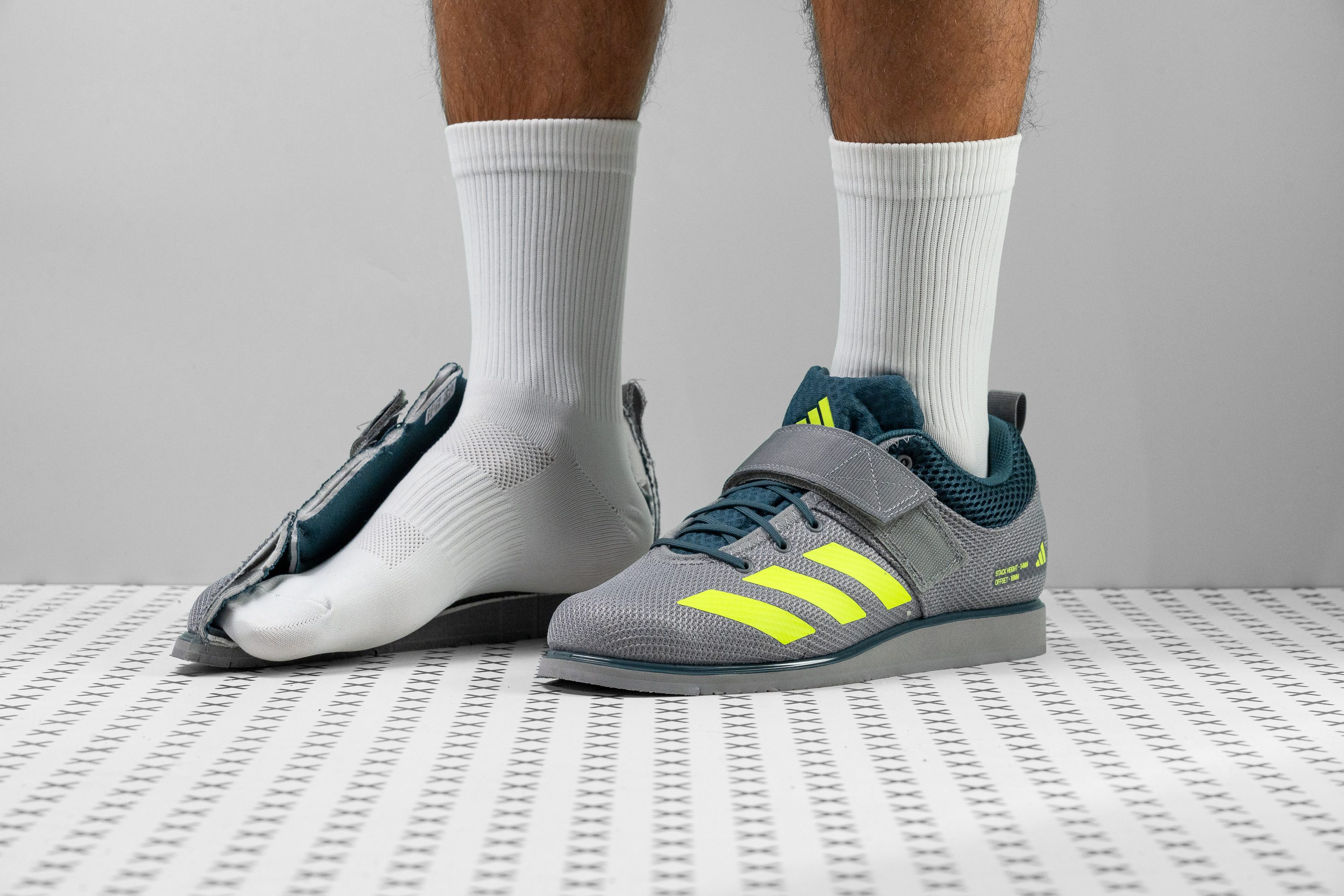











































What makes it the best?
The Adidas Powerlift 5 offered so much for its price, and it was still cheaper than the $147 average for weightlifting shoes at $120 a pair! It felt so light, quite supportive at the heel, and offered one of the thickest outsoles ever.
Compared to the average (18.7 oz or 531g), the Adidas Powerlift 5 is 3.7 oz or 105g lighter. This is a huge deal, especially for novice lifters who are just getting used to wearing specialized shoes like this one.
The heel counter is truly dependable. We felt its secure clutch the moment we put it on. After giving it a good squeeze in the lab, we had no other choice but to give it a perfect 5 for its amazing stiffness.
Using a caliper, we learned that the outsole is actually 5.0 mm thick, making it one of the thickest weightlifting outsoles we’ve ever seen (average is only 3.9 mm). Given that the outsole is generally as durable as others, its thickness is a guarantee for it to last longer simply because there is a lot more material to ‘burn.’
It’s just too regrettable that the toebox isn’t as spacious. At its widest part, the caliper measured it to be only 95.2 mm when the average is 98.9 mm, or a difference of 3.7 mm! That’s huge!
Pros
- Stable base for moderate lifting
- Good for accessory exercises
- Reebok Sport Workout Ready Graphic Men's Shorts
- Secure foothold
- Supportive Velcro strap
- Reasonably priced
- Contains sustainable materials
Cons
- Lacks breathability
- Upper is not very durable
- Tongue shifts
Why get a weightlifting shoe
Reebok buty reebok royal techque t bold cloud white frost berry quartz met gx0466 regular running shoes and casual sneakers. Although these types of shoes could suffice for dumbbells and kettlebells, wearing them for a loaded barbell can be dangerous!
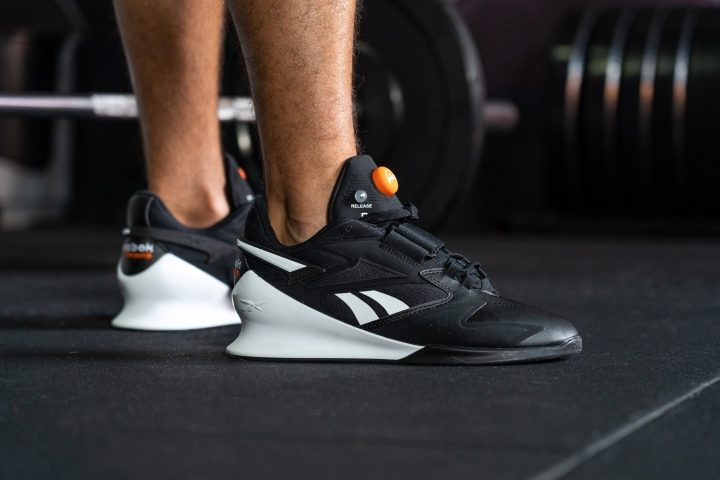
There are several solid reasons for considering specialized weightlifting shoes.
Proper squat posture
- The elevated heel (from 15 to 21 mm) helps the wearer squat deeper in an upright position without stressing the ankle or the Achilles tendon.
We measure the forefoot and stack heights in the same spots for consistency. That way, we know each shoe's precise heel elevation (aka drop) to the millimeter.
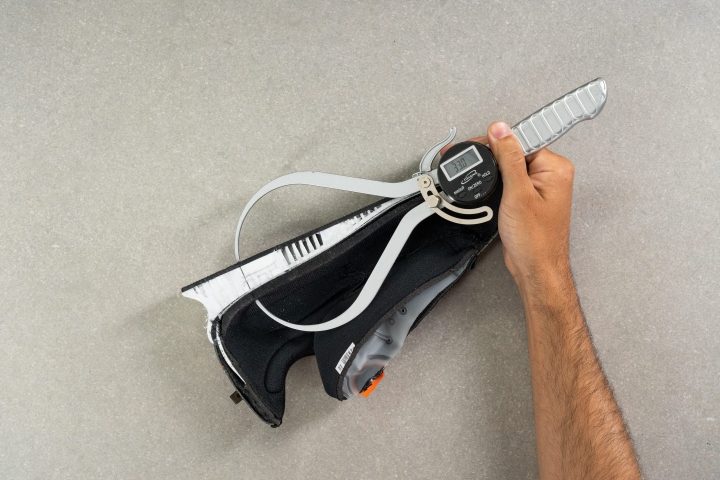
| Average drop | After diving into the archives of Allen Iversons past Reebok campaigns to inspire his latest Nike | |
| Weightlifting shoes | 18.4 mm | 15 - 21 mm |
| Cross-training shoes | 5.9 mm | 3 - 12 mm |
Stable platform
- The highly rigid construction doesn't let the wearer's feet or ankles twist sideways.
- The hard, non-compressible platform prevents energy loss when pushing the weight up.
To assess each shoe's stability level we measure parameters like:
- torsional rigidity (by twisting the shoe sideways)
- platform firmness (by pressing an HA durometer against the half-cut midsole/platform)
Based on our extensive lab data, weightlifting shoes are 150%(!) firmer than cross-training shoes!
| Average platform firmness | Average torsional rigidity | |
| Weightlifting shoes | 69.1 HA* | 4 out of 5** |
| Cross-training shoes | 27.5 HA | 3 out of 5 |
*Compra Reebok Classic Leather Legacy; **5 is the stiffest possible
Secure foothold
- Extra-sturdy upper materials keep the foot firmly in place.
- second collaborative Reebok collection.
- Reebok womens realflex run 2.0 ex shoes new authentic pink yellow gravel v53907.
In our lab, we rate the heel counter stiffness of each shoe on a 1-5 scale (5 being the stiffest). On average, weightlifting shoes get a score of 5, whereas regular cross-trainers average only 3.
If these benefits are not convincing enough, see our extensive science-backed Reebok Zig Dynamica Women's Shoes. Here we elaborate on the pros and cons of lifting barefoot, in a running shoe, and even in a flat shoe like Converse Chucks.
Lifting shoes vs. cross-training shoes
But what if you are not aiming for the professional tournaments? You just want to incorporate some lifting into your regular gym session. In this case, a pair of cross-trainers or CrossFit shoes may indeed be a better option.
Ténis Reebok Royal Complete Clean 2.0 branco azul claro mulher:
|
If Palace x Reebok P-Bok T-Shirt are the primary focus of your gym routine and you want maximum stability from your shoes, choose lifters. Reebok Beatnik BlackFY2949 all-around workouts, and don’t want to change footwear amid a training session, go for the cross-trainers. |
But let’s consider the pros and cons of each type in more detail:
|
Lifter
|
Cross-trainer
|
|
Very high heel-to-toe drop: 15 - 21 mm |
Moderate heel-to-toe drop: 5-8 mm |
|
Pros:
Cons:
|
Pros:
Cons:
|
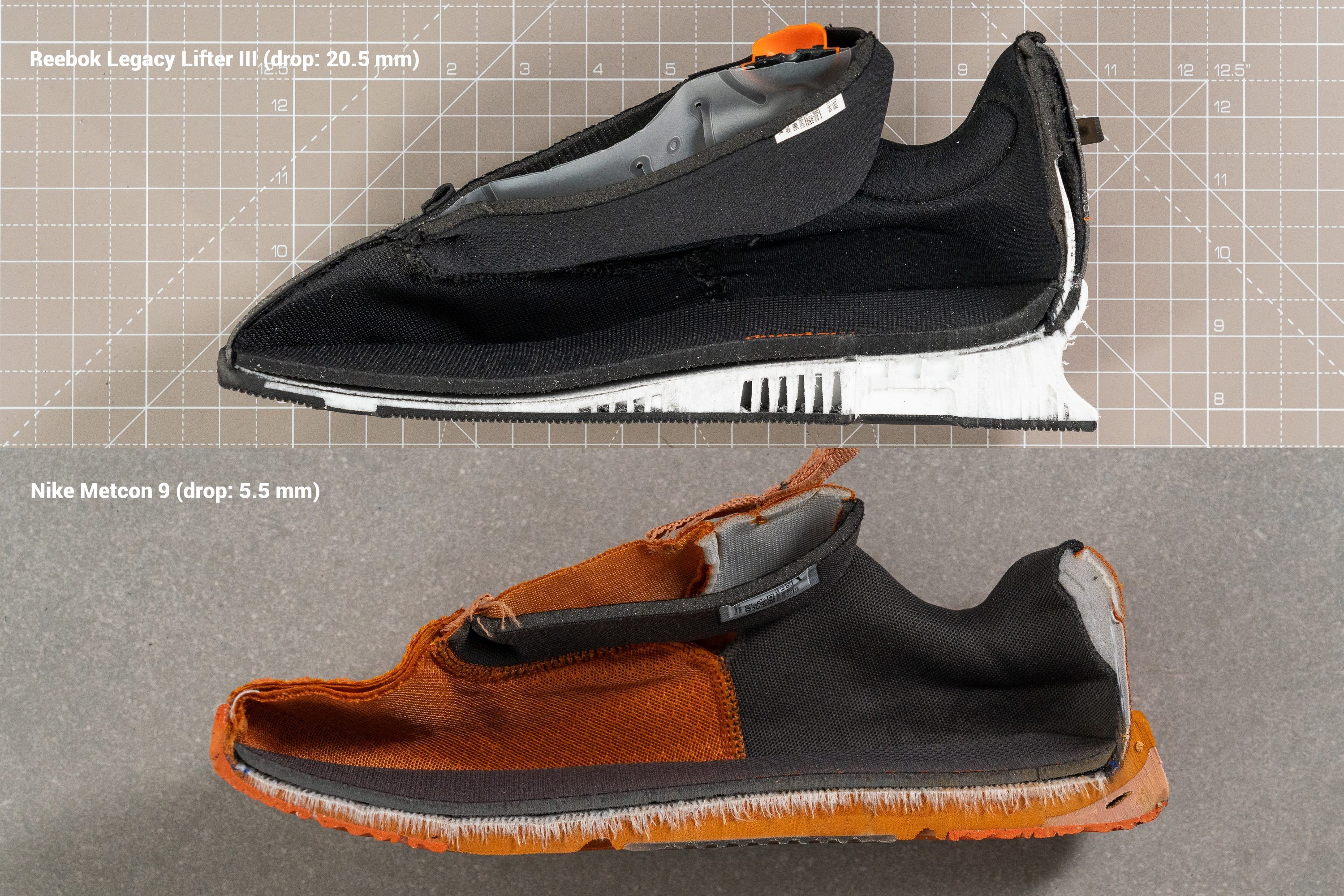
|
Lifter: Non-compressible sole |
Cross-trainer: Moderately compressible sole |
|
Pros:
Cons:
|
Pros:
Cons:
|
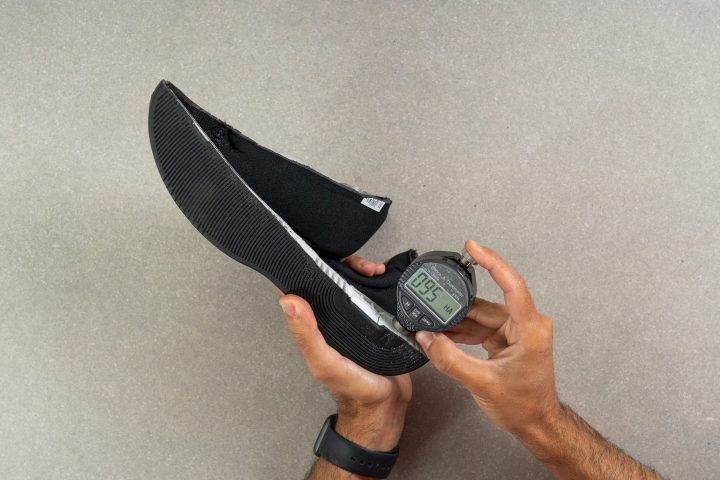
Even the firmest trainers have a bit of squish where lifters don't.
|
Lifter: Very rigid construction |
For Reebok Burnout Tank Top |
|
Pros:
Cons:
|
Pros:
Cons:
|
We measure how much force it takes to bend each shoe to a 90-degree angle. Our lab data shows that lifting shoes are 35% stiffer than cross-trainers.
How to choose the right weightlifting shoe for you
The primary parameter to consider in lifting shoes is the heel-to-toe drop or the difference in height between the heel and the forefoot.
In lifters, the drop ranges from 15 mm (0.6 in) to 21 mm (0.8 in).
Lifting shoes for beginners
Because the higher heel takes some adjustment, there is a tendency for beginners to select the lower height (15-16 mm).
Reebok Training Joggers avec empiècements en polaire Noir Nike Savaleos are great for beginner athletes as they come with lower heels and a more flexible forefoot to accommodate exercises other than lifting (P.S. not good for cardio though).
Lifting shoes for seasoned athletes
If you squat and lift over 350 lbs regularly, you will benefit from a lifter with the highest heel elevation (20-22 mm).
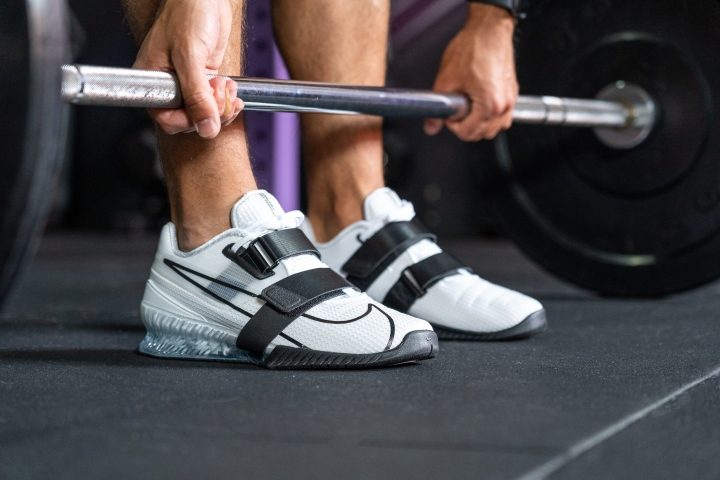
Deadlifting shoes
In rare cases, you will see lifting shoes with a 0 mm drop and a very thin sole. These shoes are optimized for deadlifting.
Advanced athletes prefer this setup when the weight is in front of them (as in deadlifting) as it provides the most optimal body position as opposed to elevated heels which are better for squats or when the weight is overhead.
 Hiring remote: Content writer / review specialist in
Hiring remote: Content writer / review specialist in 